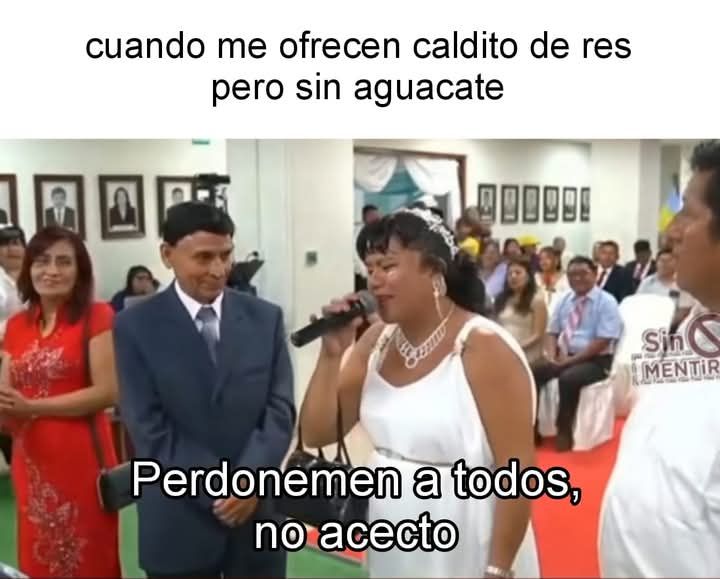"Perdnenme A Todos, No Acepto": The Viral Wedding & The Real Story
Apr 27 2025
Do you remember the viral video that sparked countless memes, the one where a bride, overcome with emotion, declared "Perdnenme a todos, no acepto" "Forgive me everyone, I do not accept"? Behind the laughter and the online parodies lies a story far more complex, a narrative of fear, threats, and the agonizing choices made in the face of danger.
The now-iconic moment unfolded in Bagua, Peru, during a collective wedding ceremony organized by the provincial municipality. The scene was set for twenty-four couples to seal their vows. Elena, the bride in question, stood at the altar, but instead of the expected "I do," she delivered a heartbreaking rejection. Her voice, thick with unshed tears, broke as she uttered the phrase that would echo across social media: "Perdnenme todos, no acepto (acepto)."
She then fled, leaving her groom and the assembled guests in a state of stunned silence. The clip, capturing the raw emotion of the moment, quickly went viral, transforming into a meme almost overnight. However, the story behind the fleeting video is far from humorous. It is a tale of a woman forced to make an impossible decision, a decision driven by the very real threat of violence.
| Category | Details |
|---|---|
| Event | Collective Wedding Ceremony |
| Location | Bagua, Peru |
| Date | Undisclosed (Recent, within the viral trend timeframe) |
| Key Phrase | "Perdnenme a todos, no acepto" (Forgive me everyone, I do not accept) |
| Protagonist (Bride) | Elena (Last name not publicly disclosed for privacy) |
| Reason for Rejection (Primary) | Fear for the Groom's safety, due to threats of violence. |
| Circumstances Leading to the Event | Bride's long-term relationship (30 years) with her partner, a reported threat to the groom's life. |
| Viral Impact | TikTok meme, widespread social media sharing, and online debate. |
| Official Sources | Information from news outlets, social media users, and individuals involved. |
| Impact on Couple's relationship | Not explicitly mentioned in the document. |
| Additional Remarks | The incident highlights the importance of empathy and understanding of emotional and psychological trauma when facing situations like this. |
| Relevant Links | Example Website for Reference (Please Replace) |
The video, a snippet of a far larger narrative, captured a moment of extreme duress. Reports suggest that Elenas decision was driven by a very real and credible threat against her fianc. The background, it seems, involved a tumultuous relationship, with dangers that escalated to the point where she felt compelled to abandon her wedding vows in order to save his life.
The fear was rooted in a long-term relationship, and a looming threat that manifested as the perceived risk of her fianc being assassinated. Faced with this terrifying prospect, Elena made a choice that, though shocking to many, was born out of desperation. It was a desperate attempt to protect the man she loved, as well as herself and her loved ones. The collective wedding became the backdrop for a life-or-death decision.
The power of social media, in this instance, is undeniable. The video spread like wildfire, creating a global phenomenon. However, this rapid dissemination also simplified a complex and deeply personal situation. The meme-ification of the event trivialized the fear and the agonizing choice that led to it. The humorous adaptations on TikTok and other platforms, while generating laughs, masked the underlying tragedy.
Its important to note the context: Bagua, Peru, is a location that has faced socio-political challenges, which may have provided the environment that created and exacerbated the conditions for threats and fear to develop. It is easy to see how circumstances like this could have caused the type of fear, anxiety, and mental distress that lead to the events described. Understanding the environment within which this event happened is crucial to appreciate the gravity of the moment, and the choices that Elena made.
The viral spread of the clip underscores the ways that our digital culture can both connect and distort. The initial shock quickly gave way to comedic interpretations, yet the true storythe fear and the threatswas largely overshadowed. This highlights the challenge of interpreting information in an age of instantaneous sharing. Raw emotion, the kind captured on camera, is reduced to a series of quick, easy-to-digest content.
The phrase "Perdnenme a todos, no acepto" became a catchphrase in social media. It represents the emotional core of the event and the depth of fear and uncertainty that Elena experienced. The phrase encapsulated both her defiance and her pain, and because of the shock of it all, the clip became so popular. In the context of the wedding ceremony, it was the ultimate rejection, an end to one narrative and the beginning of another.
The incident also prompts reflections on the pressure placed on individuals, especially in life-altering situations. Its a reminder that we must approach even the most viral content with compassion and an understanding of the story beyond the visual.
For Elena, the public spectacle of the wedding was secondary to the immediate threat of danger. Her decision reflects a desperate desire to protect the people she cared about. The choice, though dramatic, was rooted in a desire to keep her fianc safe.
In essence, the story of "Perdnenme a todos, no acepto" serves as a powerful reminder of the complexities of human emotion, the ways that fear can distort decisions, and the impact that social media can have on the portrayal of real-life events. It calls for a deeper level of empathy, moving beyond the laughter to understand the storys complete narrative.


